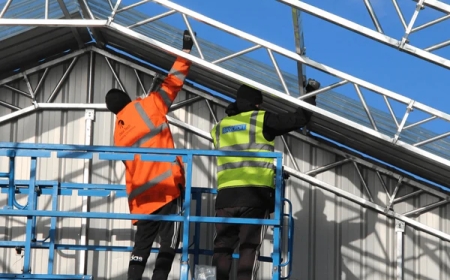Everything You Need to Know About Garage Door Repair
A thorough reference to garage door repair that covers diagnosis, cost comparisons between do-it-yourself and professional solutions, and maintenance advice.

Introduction
A malfunctioning garage door not only disrupts your daily routine but can also compromise home security and curb appeal. Whether its a squeaky hinge, a broken spring, or an unresponsive opener, understanding the basics of fixing these problems can save you time and money. A well-maintained garage door provides more than just convenienceit safeguards your belongings, boosts property value, and enhances everyday comfort. In this comprehensive guide, well walk you through common issues, DIY tips, professional considerations, maintenance best practices, and cost breakdowns to help you make confident decisions about garage door repair.
Common Garage Door Problems
Garages bear the brunt of daily use, which means doors can develop a range of issues. These mechanical systems consist of various moving parts, each of which can wear out over time. Below are some of the most frequent culprits homeowners encounter:
-
Broken Springs: These are among the most critical components of the door system. Over time, metal fatigue causes the torsion or extension springs to fracture, making the door extremely heavy or completely inoperable.
-
Worn Rollers and Tracks: The rollers help guide the door along the tracks smoothly. If they become rusted or filled with debris, the door may jerk, wobble, or make loud grinding noises during movement.
-
Bad Cables: Springs and cables cooperate to raise the door. If they fray or snap, the door may hang unevenly or fail to lift altogether.
-
Sensor Misalignment: Modern garage doors include safety sensors near the floor. These detect obstructions, but if they get knocked out of alignment or dirty, they can mistakenly prevent the door from closing.
-
Opener Malfunctions: Electrical issues, worn-out motors, or faulty remotes can result in unreliable door operation, requiring diagnostic testing and often part replacement.
A majority of door failures stem from lack of routine maintenanceignoring squeaks and wobbles can turn minor issues into major repairs.
DIY vs. Professional Repair
Deciding whether to tackle repairs yourself or call in an expert depends on the complexity and safety considerations. While some minor issues can be addressed with basic tools, others demand professional intervention.
DIY-Friendly Tasks
-
Lubricating rollers, hinges, and tracks to eliminate noise and promote smooth motion
-
Replacing weather seals to improve energy efficiency and prevent water damage
-
Tightening bolts and screws that loosen over time due to door vibration
Professional-Grade Jobs
-
Changing torsion or extension springs requires working with high-tension parts, which can be hazardous if not handled properly.
-
Adjusting high-tension cables to ensure balance and safety
-
Motor diagnostics and garage door opener replacement, especially if you notice erratic behavior or remote control failure
Attempting high-tension repairs without proper training can result in serious injury. Certified technicians carry specialized tools, follow safety protocols, and provide warranties for their workmaking the investment worthwhile.
Safety should never be compromised. When in doubt, enlist a certified technicianespecially for spring and cable work.
Maintenance Tips for Longevity
Routine upkeep can extend the life of your garage door system and stave off expensive repairs. Just like a car engine, this complex mechanical structure requires regular attention.
-
Monthly Visual Inspections
Scan for loose hardware, misaligned rollers, and signs of rust or wear on springs and cables. -
Quarterly Lubrication
Use a silicone-based or lithium spray lubricant on all moving parts to minimize friction and reduce noise. -
Biannual Balance Tests
Lift the door halfway by hand after disconnecting the opener. If it doesn't stay put, the springs may need adjustment. -
Annual Professional Tune?Up
Hire a technician to inspect safety features, conduct sensor calibration, and fine-tune mechanical parts.
Homeowners often overlook maintenance until a breakdown occurs. Consistency is keysmall efforts now can prevent major headaches later.
Cost Breakdown and Comparison
Knowing what to expect cost-wise helps you plan ahead. Heres a breakdown of common garage door repair expenses:
| Issue | Typical Cause | Average Cost (USD) |
|---|---|---|
| Spring Replacement | Metal fatigue | $150 $350 |
| Roller/Track Realignment | Debris, rust, misalignment | $80 $150 |
| Cable Replacement | Wear and tear | $100 $200 |
| Sensor Recalibration | Misalignment or wiring fault | $50 $100 |
| Opener Motor Repair/Replace | Electrical or motor failure | $200 $500 |
Depending on the material, door size, and labor costs in the area, these numbers may change. To prevent unforeseen fees, always obtain a thorough written estimate before hiring a professional.
When to Upgrade vs. Repair
Sometimes, Investing in a new door can be more practical and economical.. If your door is over 15 years old, consistently noisy, or has visible damage like warping or rot, it may be time for a full system upgrade.
New garage doors offer modern benefits:
-
Enhanced insulation for better energy efficiency and temperature control
-
Quieter operation with belt-driven openers and nylon rollers
-
Smart-home integration for remote monitoring and voice command access
-
Improved safety features, such as motion sensors and rolling code technology
Choosing garage door installation over repair could increase your homes value, especially if you're planning to sell in the near future.
Conclusion
Garage door repair doesnt have to be daunting. By recognizing common problems, weighing DIY tasks against professional services, and adhering to a regular maintenance schedule, you can ensure smooth, safe operation for years to come. Whether youre lubricating hinges or replacing springs, the right knowledge empowers you to make informed choices about your homes first line of defenseyour garage door.
Read more: Garage Door Installation









































